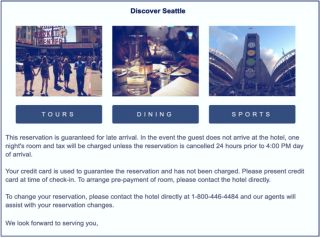KEY POINTS-
- Progressive healthcare providers have begun to incorporate hospitality principles into their operations.
- This includes the design of more welcoming arrival environments and pre-registration.
- Imagine having the cost, with all additional charges, clearly visible prior to care.
Using Hospitality Principles to Reduce Healthcare Visit Anxiety
Have you ever felt anxious or fearful about visiting a doctor? A hospital? Or a walk-in clinic? This should come as no surprise, given the uncertainty associated with many medical procedures, both simple and complex. Anticipation is a natural precursor of consumption because these situations are intangible (that is, one cannot touch or feel them) and involve simultaneous production and consumption (unlike a car one cannot take for a test drive prior to purchase). These two characteristics lead to six catalysts of patients’ anxiety:
- The diagnosis.
- The recommended treatment.
- Possible unknown outcomes of the treatment.
- The attitude of the staff that delivers the care.
- The inconveniences they will likely endure throughout the process (for example, the completion of repetitive forms, wait times for appointments, billing disputes).
- The cost of the treatment.

Direct engagement with the clinical team is generally required to address the first three catalysts. Lessons learned from the hospitality industry can be used to address the remaining three items.
First, consider the anxiety caused by the attitude of the staff that delivers the care. To reduce this anxiety, hospitality firms focus on employee engagement. Ritz Carlton has the 10-foot by 5-foot rule. When the guest is within 10 feet, the employee should make eye contact and within 5 feet offer a warm greeting.1 Edward Mady, former West Coast Regional Director for the Dorchester Collection and 2017 Independent Hotelier of the World, taught his team members that there are 14 keywords they should always use when serving guests: “Remember me, recognize me, anticipate my needs, give me what I want on time.”
Second, consider the anxiety caused by the inconveniences patients will likely endure throughout the process (from the time they make their appointment to the time they leave.) The best hospitality service providers use the time between when guests make a reservation and when they arrive to reassure them their reservation is confirmed and create positive anticipation about what to expect during their stay. An example of this type of communication from the Inn at the Market in Seattle, Washington is shown below.2
When guests check in, they are presented with a registration form that is pre-populated with the information they provided when they made their reservation. Thus, they only need to verify the accuracy of this information upon arrival. Hospitality also uses colors, music, lighting, and scents to create a welcoming environment.
While guests are on the property, the employee engagement strategies discussed are activated. Several lodging companies and at least one popular food delivery organization now offer some form of satisfaction guarantee. “If you’re not 100 percent satisfied, we don’t expect you to pay. That’s our promise and your guarantee.” This promise ensures employees will do whatever is responsible and necessary to address guest complaints satisfactorily.
After guests check out, hospitality service providers employ a multitude of procedures to solicit feedback. These include aggregate ratings of the overall guest experience, as well as component ratings of discrete moments of truth. Most solicit the participation of all guests (not a sample of guests), and the resulting data are evaluated with reference to predetermined key performance indicators.
Finally, consider the anxiety created around the cost of the service. In the hospitality industry, the total price including all taxes and additional charges is clearly visible prior to purchase. Even ride-share apps such as Lyft give the price prior to booking the ride. Some hotels even provide guests with the ability to purchase what is known as an American Plan (AP) rate. This includes lodging plus breakfast, lunch, and dinner for the length of the stay. Many of the limited-service hotels provide free breakfast. All of which the customer knows prior to purchase.
Progressive healthcare providers have begun to incorporate hospitality principles into their operations. Examples include the design of more welcoming arrival environments, pre-registration to minimize the time required to collect and approve administrative information upon arrival, training staff to become more observant and empathetic, the issuance of pre-arrival messaging that includes instructions on “what to expect,” even the vicarious introduction of clinical teams through the issuance of pre-arrival video.3
One healthcare system adopted one of the hospitality lessons mentioned. Specifically, the Geisinger Health System adopted a “guarantee” performance in 2015. The concept is to guarantee patients they would not be responsible for copays or any additional charges for select procedures or services that failed to achieve the intended outcome in a manner deemed satisfactory by patients. With the “Proven Experience” program, the inherent promise to patients is both simple and compelling: “If things go wrong, you will get your money back.” Disputes, of which there have been few, are referred to patient advocates who are empowered to decide if a credit or refund is appropriate and, if so, in what amount.



